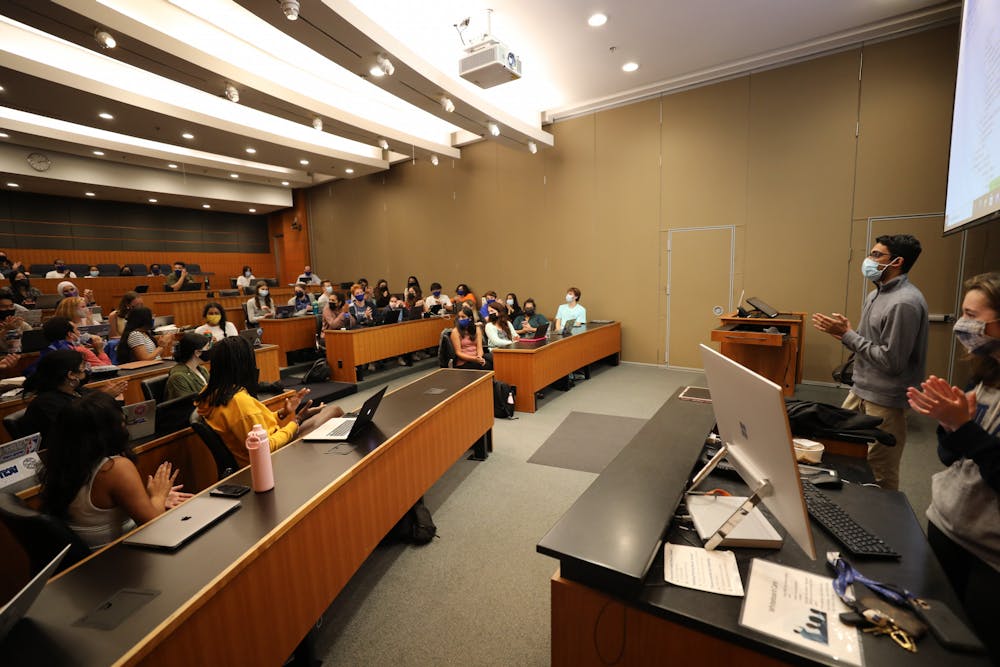On Wednesday, Duke Student Government leaders gave introductory speeches and unveiled plans for first-year election reforms at the first Senate meeting of the year. Senators also nominated and confirmed members to the University’s presidential, provost and senate committees.
Juwan Jacobs, the DSG advisor and assistant director for student involvement and leadership, introduced himself as the organization’s new advisor. He was followed by DSG President Lana Gesinsky, a senior, alongside Executive Vice President Devan Desai, a senior.
Gesinsky emphasized her campaign calls for “community, clarity and communication” and a “time of change” during her opening speech.
“It's really easy just to think about yourself, what you want, [and] what you would do. I think this year just try to remember we’re elected for the students, by the students,” she said.
Gesinsky and Desai also covered upcoming first-year election reforms. At-large applications open to first-years will be due on Sept. 28 with interviews held after fall break. However, elections for first-year senators, which were previously held during the first two weeks of class, will not be held until “the Wednesday or Thursday just before fall break,” according to Desai.
“Your second week on campus is literally terrifying. No one even knows your name,” Gesinsky said. “They're trying to fit into their classes and have to run for a position. So that's why we're pushing it back. We think it makes it easier on the first-years.”
New reforms ultimately seek to clarify the DSG election process for incoming first-year senators. Prospective first-year senators will shadow the next three Senate meetings, then observe three committee meetings. Senators will also offer coffee chats, open houses and information sessions for interested students.
“Instead of us evaluating them, it's them evaluating us and saying, ‘Is DSG a good fit for me?’” Gesinsky said. “That's one of the first steps that we're trying to do with transparency and communication.”
President Pro Tempore Isaiah Hamilton, a junior, made announcements regarding DSG protocols, such as aiming to move meetings to 7:00 p.m. instead of 8:00 p.m. and removing the DSG Zoom option.
“For this year, [I’m] hoping everyone is leading with kindness, leading with respect—allowing people to make mistakes in this space,” he said.
Junior Anthony Salgado also announced his resignation from vice president of equity and outreach. He will be replaced by Zara Thalji.
“There's a lot of things that I think that Duke administration really pulled under the rug for Latinx students, for first-generation low-income students. [My] resigning from this role does not necessarily mean that I will stop fighting for those groups,” he said. “I just really want to take a chance to reevaluate what community means to me, what organizing means to me, what coalition building means to me.”
After nearly a half-hour of debate, senators voted 18-8 to allocate $3,550 from the DSG fund code for customized voting devices used for Senate attendance. The funds will be handled by Desai, Hamilton and Jacobs. Any unused funds will be returned to the DSG fund code.
“The voting devices will be used to maintain an accurate record of all votes pertaining to legislative activity by the DSG Senate and attendance purposes,” the budgetary statute read.
Hamilton said the electronic voting clickers would “standardize attendance and voting, which I think would help with efficiency.”
In other business
Senators allocated $1,660 to duARTS’s “Dear Evan Hansen” showing, $4,500 to the Duke Dance Council’s fall showcase, $2,450 for the Duke Symphony Orchestra’s Pops Concert and $6,000 for the Muslim Students Association’s speaker event with Suhaib Webb.
Senators also approved an organization name change for Duke STEM Connect, formerly Duke Health and STEM Connect. According to the name change form, the organization decided on the change after the executive team found that it no longer “actively include[d] health-related activities/education/enrichment in [its] club operations/volunteering.”
The Senate also confirmed nominees for student representatives on the University’s presidential and provost’s committees and for internal Senate committees by a vote in the chamber.
Presidential Committee nominations
DSG senators nominated Gesinsky to the President’s Council on Black Affairs and the University Priorities Committee. The DSG President is allocated a spot on the two committees through committee bylaws.
Brien Brennan and Mick Tobin were nominated for the President’s Advisory Committee on Investment Responsibility for two spots for President Vincent Price’s final decision.
Dave Surzykiewicz and a future cabinet member to be confirmed in the coming weeks were nominated for the President’s Athletic Council.
Aashna Sawhney was nominated for the President’s Campus Sustainability Committee.
Ashley Bae and Zoe Tishaev were nominated for the President’s Committee on Facilities and Environment.
Desai was nominated for the President’s Advisory Committee on Institutional History.
Tishaev was nominated for the President’s Arts Advisory Committee.
Bianca Ingram was nominated for the President’s Council on Black Affairs, in addition to Gesinsky.
Provost’s Committee Nominations
Jax Nalley was nominated for the Provost’s Academic Programs Committee.
Chloe Decker was nominated for the Provost’s Interdisciplinary Strategy Council.
Karen Xu was nominated for the Provost’s Library Council.
Tobin was nominated for the Provost’s University Schedule Committee, and Talia Granick was selected as an alternate.
Senate Committee Nominations
Ishaan Brar, Decker, Elena Kara, Akhilesh Shivaramakrishnan and Surzykiewicz were nominated for the Senate Judiciary Committee.
Granick, Yadira Paz-Martinez, Swetha Rajagopal, Clay Thornton and Kristina Wong were nominated for the Internal Affairs Committee.
Brar, Decker, Shreya Joshi, Rajagopal and Victoria Wulff-Anderson were nominated for the Board of Elections.
Brar, Brennan, Salgado and Thalji were nominated for the Financial Oversight and Appeals Committee.
Anisha Reddy contributed reporting.
Get The Chronicle straight to your inbox
Signup for our weekly newsletter. Cancel at any time.

Audrey Wang is a Trinity junior and editor-in-chief of The Chronicle's 119th volume.

